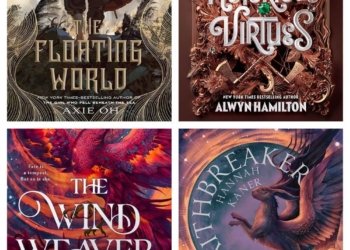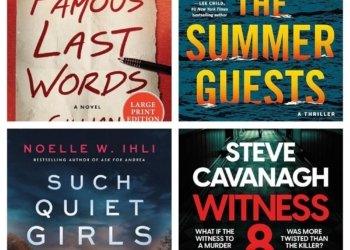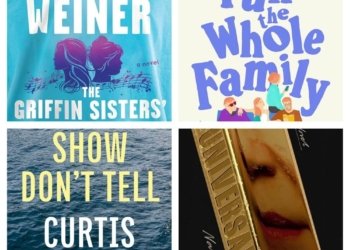No products in the cart.
A Conversation with Jeff Berney, a Suspense, Thriller Author
Jeff Berney is an American novelist. His debut novel, “A Killer Secret,” was published In December 2019 followed by “The Fall of Faith” in October 2022. When he's not writing, he spends his time with his amazing wife and children.
861
SHARES35.7k
VIEWSJeff Berney has been living in his head since 1974, so it wasn’t much of a jump for him to live in his characters’ heads. After spending more than 25 years as an advertising writer and creative director, he got the crazy idea he’d like to give novel writing a go in his spare time. Not so easy when you have seven kids and a menagerie of pets at home. Not to mention a wife you love and enjoy spending time with. But he somehow finds the time and has written two novels to date. The first is a dark psychological thriller called “A Killer Secret.” His latest, “The Fall of Faith,” is a gritty domestic thriller that has been compared to Kurt Vonnegut.
Let’s get started with a quick rapid fire.

Q1. If you could be transformed into one animal, which one would you choose?
That’s easy. I’d transform into a T-Rex. They’re the coolest of the cool.
Q2. Finish the phrase “the way to my heart is…”
The way to my heart is a hidden labyrinth, the secrets of which only one woman knows.
Q3. Are you more of an introvert or an extrovert?
I’d answer that but it’d take too much energy.
Q4. Do you watch shows one episode at a time or binge whole seasons?
Binge, baby! But then I wish I hadn’t because there’s something magical about the wait for the next installment.
Q5. Would you rather travel to the past or to the future?
The past is history. Forward. Always forward.
Q6. What is your last Google search?
Types of knots people can’t get out of…I swear it was book research.
Q7. What object do you misplace or lose the most?
My mind.
Q8. What is the kindest thing someone ever did for you?
Marry me.
Q9. If given the chance to start your life over, would you take it?
No, but I’d erase the bigger mistakes.
Q10. What is the best present you have ever received?
My wife’s love.
Q11. Describe your style in one word.
Dad.
Q12. If you were to devote the rest of your life to philanthropy, what cause would you choose?
Something that benefits children. There are too many discarded kids in this world who don’t have a chance in life.
It’s time for a more detailed conversation, Jeff.
You’ve answered our rapid fire brilliantly, Jeff. Now, it’s time for our readers to know more about the person behind the book.
Q. There’s a grand stage surrounded by fifty thousand people listening to authors introducing themselves. They are bored and restless of listening to introductions all day. It’s your turn. How would you introduce yourself?
I’d have the visual effects team turn on the strobe lights and fire up the smoke machines. Then I’d strap into a harness hung from the rafters and have them slowly lower me into the middle of the crowd as I sing (or lip-sync, rather) The Who’s “Behind Blue Eyes.”
Q. Well, that will keep you in our thoughts. So, what books did you grow up reading?
I read everything I could get my hands on. I was the kid who’d rather be in his room reading than outside playing. In fact, I blame books for my lack of muscle tone. My favorites as a kid were things like Robert Asprin’s Myth Adventure Series, The Encyclopedia Brown books, Stephen King and steamy romance novels stolen from my mom’s bedside table.
Q. Interesting. Has writing and publishing a book changed the way you see yourself?
Not at all. I still have the same lack of self-esteem I’ve always enjoyed. But now I can reinforce those negative sentiments at any hour of the day by reading my reviews. Sure, I have far more positive reviews than negative, but my DNA makes me blind to those.

Q. Would you share something about yourself that your readers don’t know (yet)?
I have two guitars and a banjo, but I really can’t play them at all. I’ve written songs and can play at the guitar (by which I mean I know some chords but have zero rhythm). I bought the banjo solely to learn to play that dueling banjos song from Deliverance.
Q. Now comes the most anticipated question that every author must answer. How do you process and deal with negative book reviews?
I retreat to the darkest room in my basement with a cat o’ nine tails and remove my shirt. I then whip myself across the shoulders after reading each word aloud. Then I go upstairs to the kitchen and grab the industrial-sized container of salt I bought just for this occasion and pour it all over the wounds. I find this is the best way to keep my ego in check.
Q. What comes first for you — the plot or the characters — and why?
That’s a great question. It’s a little of both. I’m an outliner for sure. And because I right thrillers, I want to make sure the plot is strong and can withstand a few unexpected twists. But I despise hollow or one-dimensional characters, so I make sure all my fictional friends seem as compelling and flawed as anyone I know in real life.
Q. How do you develop your plot and characters?
Very slowly. Not to go all tortured artist on you, but my process is a very internal one. The story seeps into my soul then out my pores and onto the computer. I create a detailed outline and then break the story down into scenes that leave me room to improvise and mess things up along the way. If I’ve done my job, at some point in the writing, my characters take over and I’m just along for the ride. They’re biographer of sorts.
Q. What does literary success look like to you?
That’s a loaded question that gives me anxiety. It’s hot in here. Are you hot? I feel like it’s hot. The pressure is unbearable. Seriously, did you mess with the thermostat?
I’d love to say that my literary success looks like mad wealth and world-wide adulation. But, I’m more a realist. I’d actually be happy if I was able to support my family. But if that isn’t feasible, well I’d consider myself successful if I can write until the day I die. Preferably leaving behind a perfectly finished manuscript that will fetch my surviving wife and children a handsome sum, thus making up for all the insufferable writer-like things they had to put up with from me.

Q. Let’s talk about your book. Tell us about it. No major spoilers.
My latest novel, my second, is called “The Fall of Faith.” It’s a gritty and dark domestic thriller about love and faith and survival in small town America.
The story follows Jimmy, a trucker on his last run who has nothing to go home to. When his truck breaks down in Eden, Missouri, he learns the hard way that the small town is nothing like its biblical namesake. In fact, it’s more like hell on earth. And he soon finds himself falling in love with a local woman as danger closes in on him from every angle.
At its heart it is about the human drama that comes from just trying to live your life in this messed up world.
Q. What part of the book did you have the hardest time writing?
The climax. I wanted it to be meaningful but not over the top. I actually wanted it to be kind of an anti-climax if that makes sense. It probably doesn’t, but I appreciate you humoring me. I put the main characters through a lot in this novel, and I wanted the climax to change the pace of the story so that as it spirals to the final conclusion, the reader’s emotions are shaken to the core.
Q. If you could meet your characters, what would you say to them?
Shame on you. Go home and think about what you’ve done. All of you.
Q. What is your writing process like? Are you more of a plotter or a pantser?
I’m a big time plotter. I use The Snowflake Method. I start with a single sentence that encapsulates the main thrust of the story. Then I break that into several sentences, then several paragraphs, then several pages. At the end, I have a very detailed description of the book I’m about to write. Now, I will say, I leave room for improvisation and change of course. Otherwise it’d feel like I was writing a report and not a novel. And where’s the fun in that?
Q. What has helped or hindered you most when writing a book?
My love of my wife and kids really does get in the way of my book writing. I truly enjoy their company and count myself lucky to have such a large and amazing family. They take me away from my imaginary world all the time, and I wouldn’t have it any other way.
Q. It’s been fun. Now, before we wrap this up, do you have any suggestions to help me become a better writer? If so, what are they?
Write what you want. Too many writers look at the charts and write to get rich. And you can tell that the passion isn’t there. Their heart isn’t in it. Just like any other profession, you will never be happy if you are just doing it to chase a paycheck.
Related Posts
A Conversation with Melanie Shawn, a Romance Author
NYT & USA TODAY bestselling author Melanie Shawn lives in Southern California and is a mama to two adult people...
10 Most Anticipated Fantasy Books of Spring 2025
As the seasons change and we step into the vibrant energy of spring 2025, readers everywhere are eagerly anticipating fresh...
10 Most Anticipated Thriller Books of Spring 2025
Are you a bookworm who thrives on heart-pounding suspense and unexpected twists? Get ready to mark your calendars and clear...
8 Most Anticipated Contemporary Books of Spring 2025
Are you a bookworm always on the lookout for the next big literary gem to dive into? Well, get ready...
About Us

Trenzle
Where Trends are made and discovered
Trenzle is your official source of discovering the latest people, work, and ideas that deserve to trend. Discover Authors and their books, Creators and their work, People and their opinions, and Stories from around the globe.
Learn more
Latest Posts
Trenzle Top 10 Trending Free Book Deals for April 23, 2025
April 23, 2025
A Conversation with Melanie Shawn, a Romance Author
April 19, 2025
Categories
© 2023 Trenzle - Online Author News & Magazine









